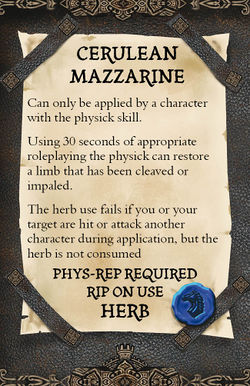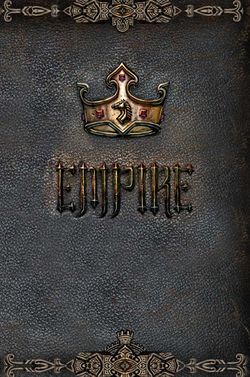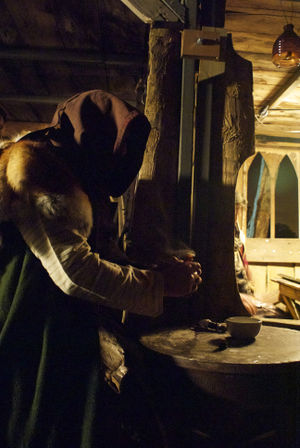Potion
(→Herbs) |
(→Herbs) |
||
| Line 6: | Line 6: | ||
Most minor poisons are obsolete within the Empire due to the presence of magicians who can remove basic poisons with [[Purify|a simple incantation]], and apothecaries who can treat most poisoning with [[Imperial Roseweald|a simple herb]]. Those looking to harm their opponents through such means seek out apothecaries who can brew potent, near magical toxins. | Most minor poisons are obsolete within the Empire due to the presence of magicians who can remove basic poisons with [[Purify|a simple incantation]], and apothecaries who can treat most poisoning with [[Imperial Roseweald|a simple herb]]. Those looking to harm their opponents through such means seek out apothecaries who can brew potent, near magical toxins. | ||
==Herbs== | ==[[Herbs]]== | ||
{{:Herbs}} | {{:Herbs}} | ||
Revision as of 16:44, 13 April 2016
Overview
There are five potent herbs that are common throughout the Empire. These herbs are infused with magic which allows them to be used by a skilled physick to cure a range of ailments.
In addition, it is possible for a skilled apothecary to mix herbs together to create a powerful potion. Anyone who is not so badly wounded that they cannot fight can consume a potion unaided, and anyone can be fed a potion to receive the benefits.
Most minor poisons are obsolete within the Empire due to the presence of magicians who can remove basic poisons with a simple incantation, and apothecaries who can treat most poisoning with a simple herb. Those looking to harm their opponents through such means seek out apothecaries who can brew potent, near magical toxins.
Herbs
Overview
There are five potent herbs that are common throughout the Empire. These herbs are infused with magic which allows them to be used by a skilled physick to cure a range of ailments.
An apothecary can instead use herbs to brew a potion, which can then be used by anyone who is not dying on zero hits.
Many other herbs exist in the Empire setting. A small number have magical properties (such as realmsroot) but for the most part these herbs exist below the abstraction layer. While they may have useful qualities, but they are not used in the creation of potions or the treatment of conditions. Examples include the contraceptive plant bitterweed, the herb used to allow a person to change their gender expression, tobacco, tea, and the many plants with minor narcotic or medicinal effects such as those found in the marshes of Kallavesa. Players are free (within reason) to create and talk about these minor herbs as they see fit, as long as they understand that they remain below the abstraction layer and will not have an impact on the game.
Rules
- You can only use the magical effects of a herb if you have physick skill
- It requires 30 seconds of appropriate roleplaying to use a herb
- The herb use fails if you or your target are hit or attack another character during application, but the herb is not consumed
- Any character who has a herb garden receives new herbs after each downtime
- You cannot use a herb without a suitable card and phys-rep present
There are five common herbs in the Empire; it is possible for fleet owners to purchase them from foreign ports but most Imperial herbs are grown in a herb garden. A character who owns a herb garden will receive 14 herbs from their resource in their downtime.
Although herbs have powerful healing properties, they require skill to apply. They can only be applied by a character that has the physick skill, usually as part of some appropriate medical roleplaying.
Herbs are indicated by a small card (85mm x 55mm), printed by Profound Decisions, that indicates the presence of the herb and includes the rules for using the herb. You must provide a phys-reps for any herbs that your character owns, and the cards should be kept with the phys-reps, otherwise you cannot use the herbs in game and should not carry the cards on your person.
An appropriate phys-rep for a herb is a small vial of liquid, or a pile of herbs, leaves or pieces of plant matter. You can also focus on phys-repping a suitable container for the herbs instead if you prefer.
In addition to the five potent herbs there are a number of less common herbs like realmsroot. These herbs are hard to cultivate and often lack the power or flexibility of the five most useful herbs. These rare herbs use a potion lammy rather than a card - it is not possible to be certain what they do until they are used.
| Bladeroot | Cerulean Mazzarine | Imperial Roseweald | Marrowort | True Vervain |
|---|---|---|---|---|
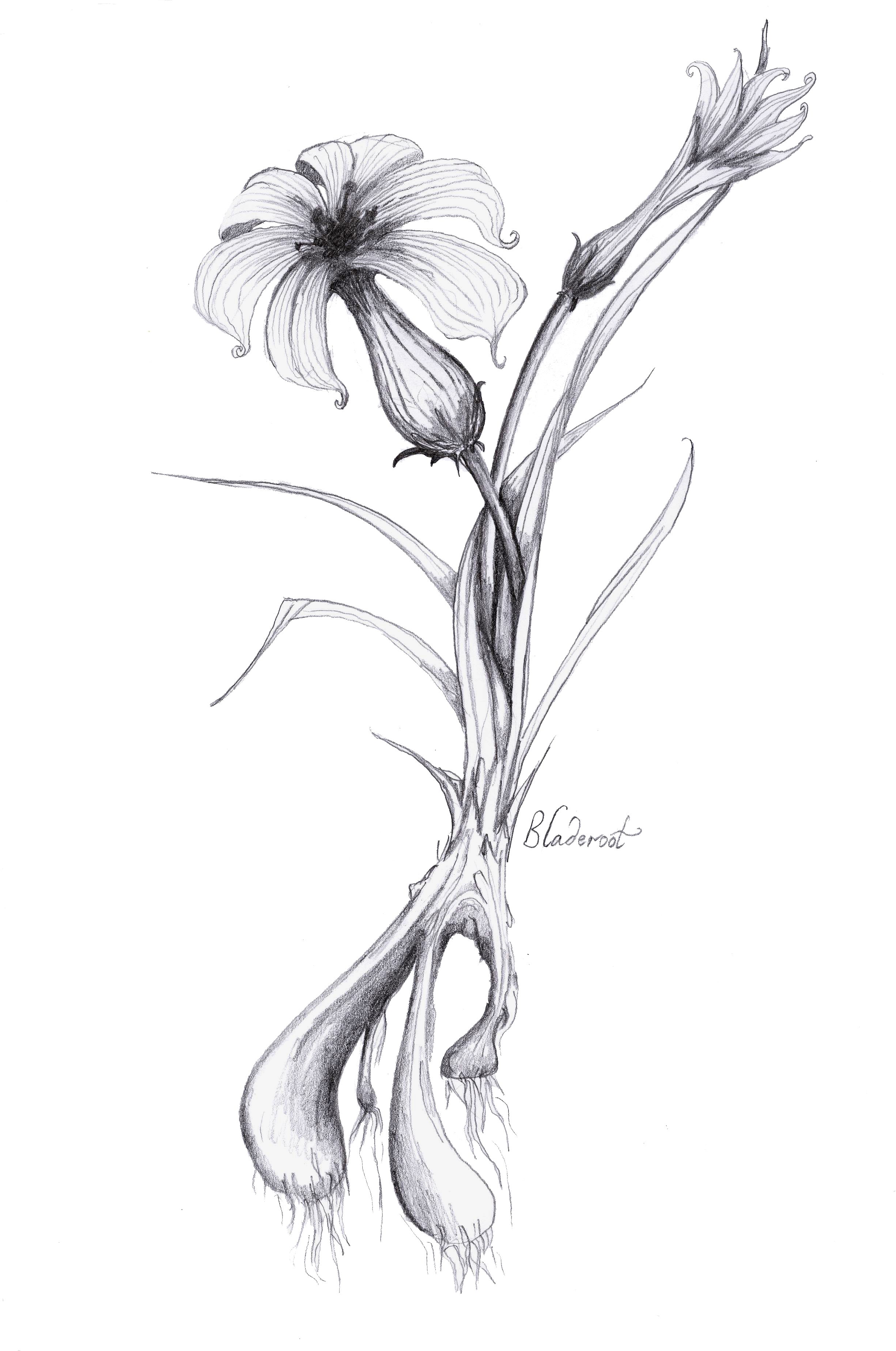
|
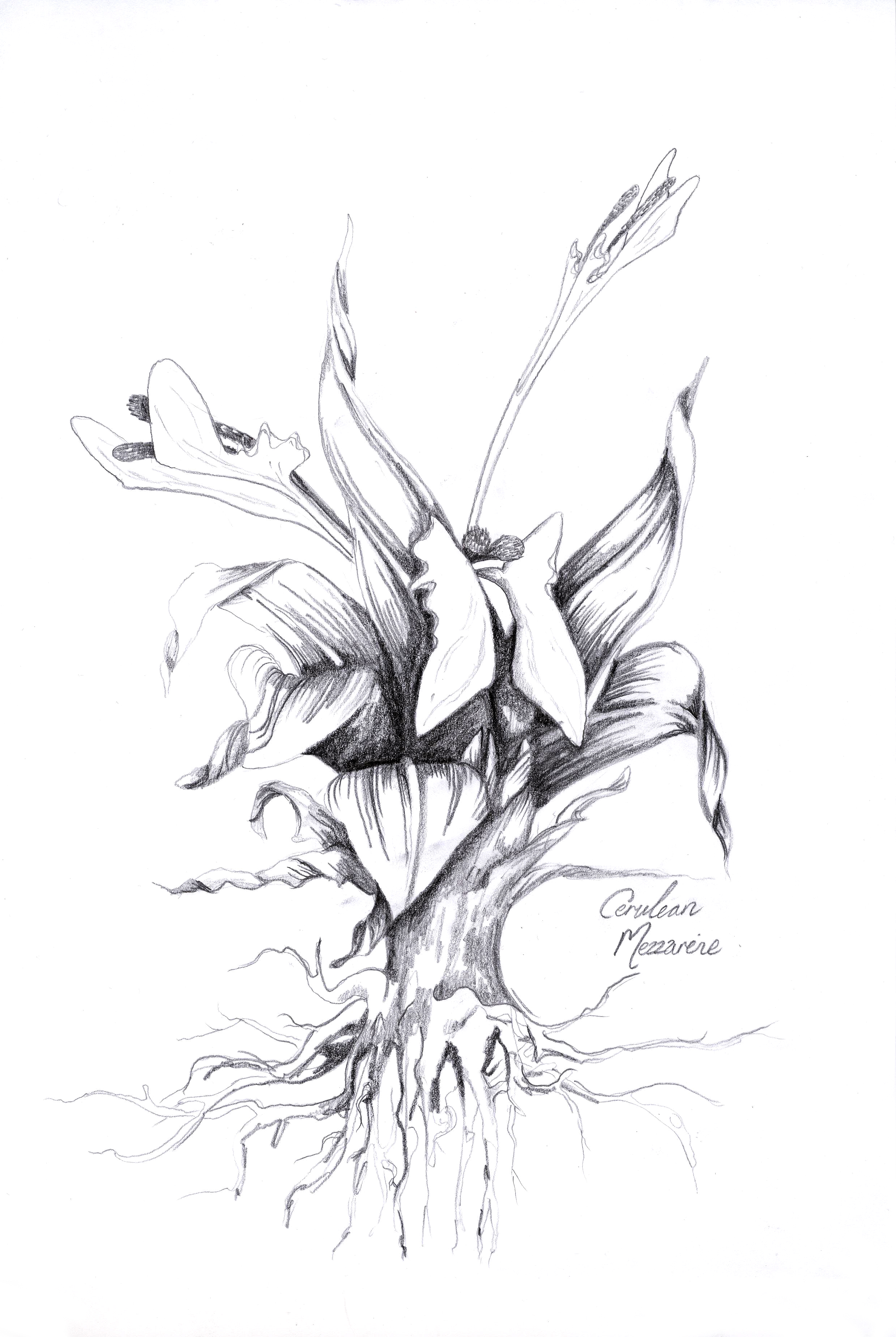
|
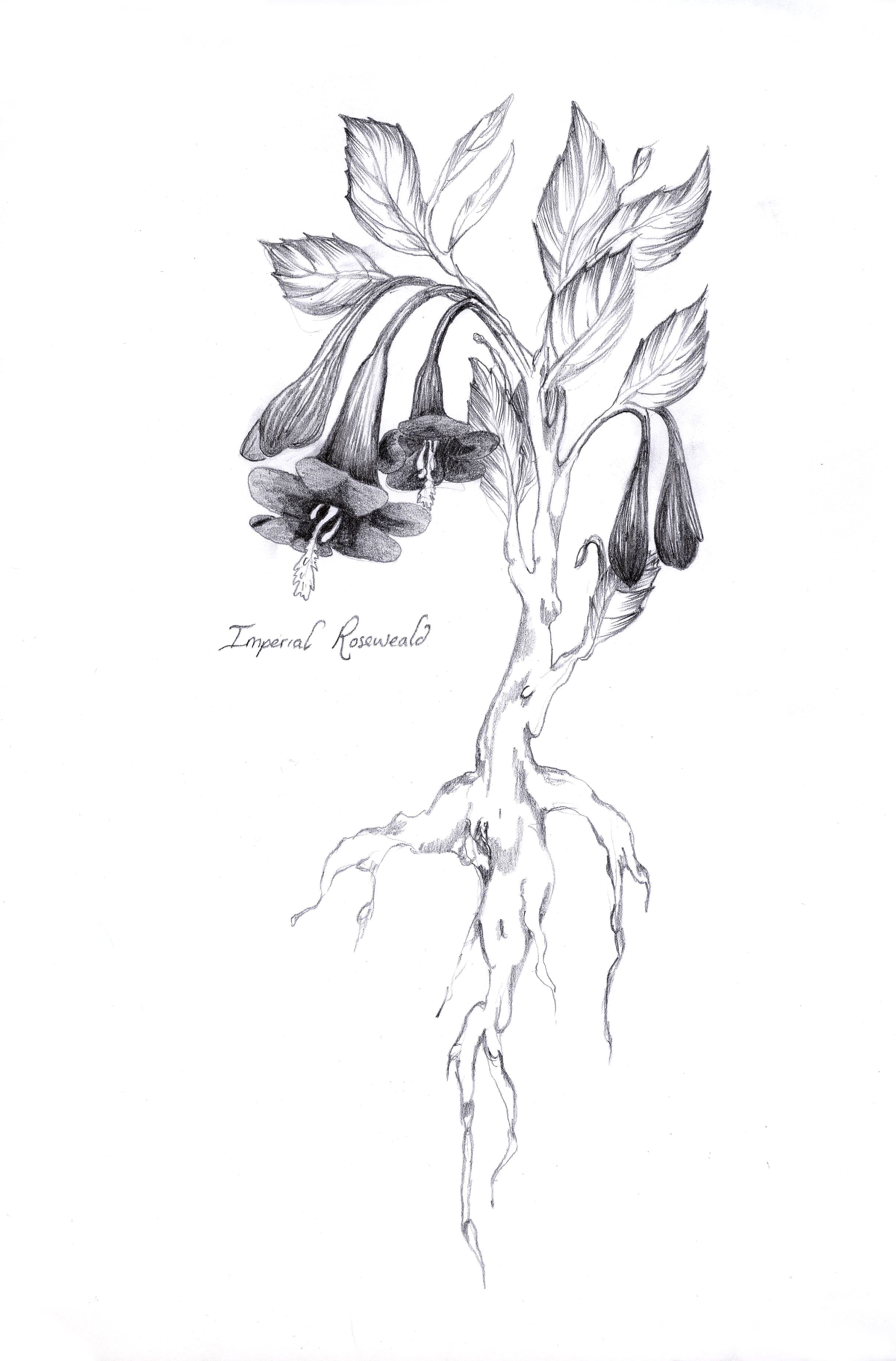
|
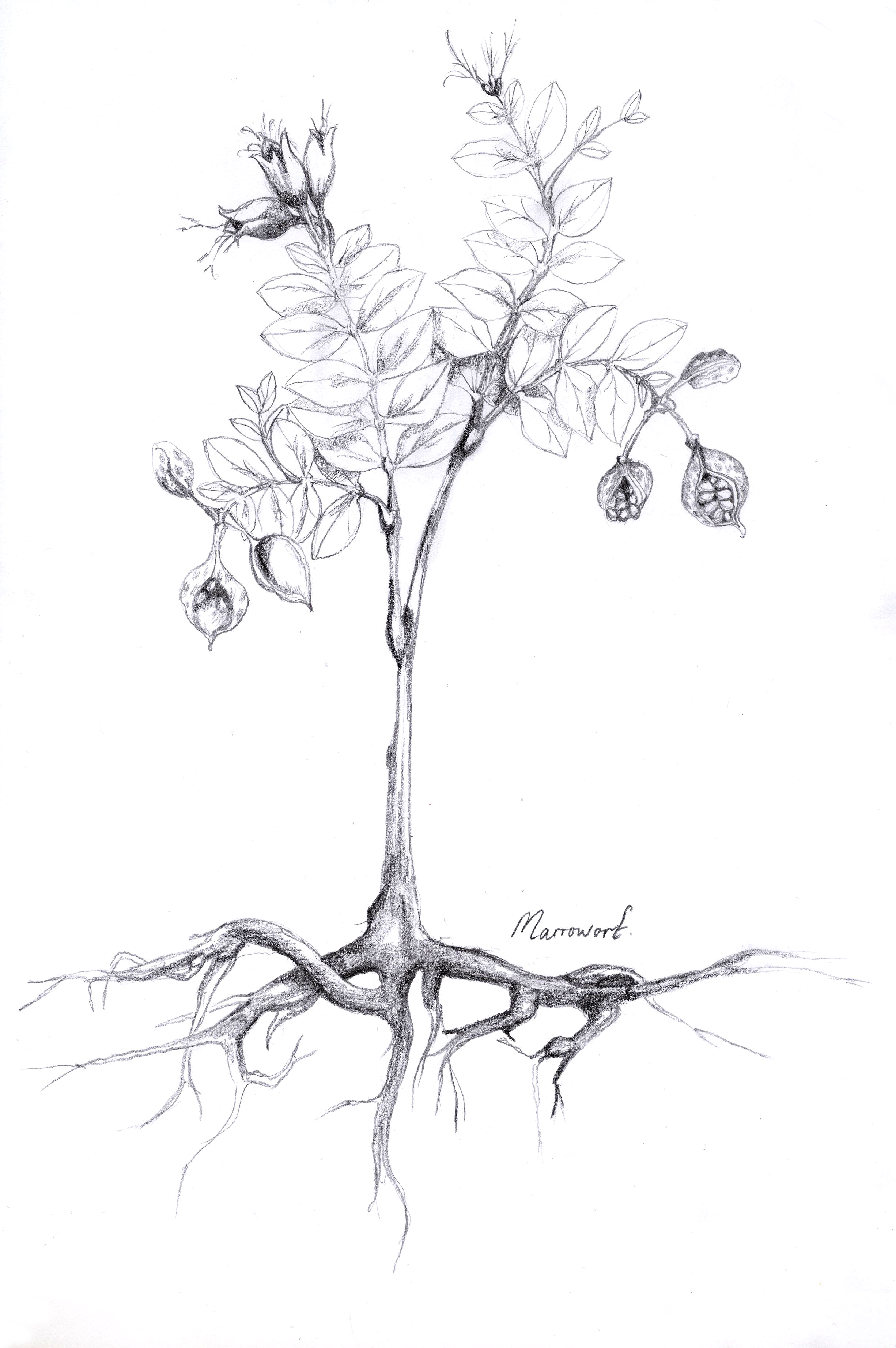
|
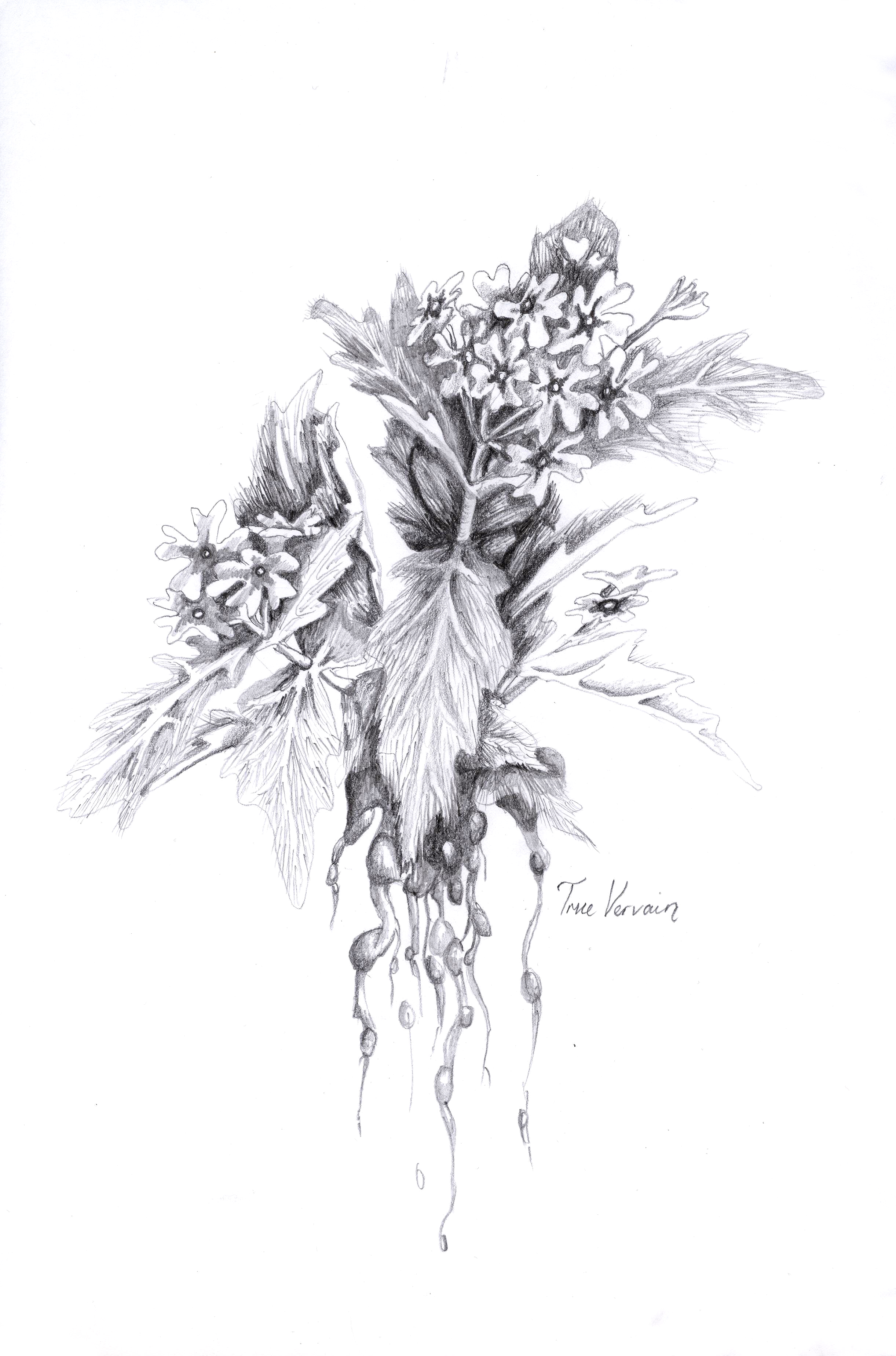
|
Blue mazzarine to save a limb
Grey bladeroot stems a weakness dim
Red roseweald poison's power breaks
True vervain body's healing wakes
Though marrowort takes soldiers' pain
At battle's end they'll fall again
Potions
- Any character can use a potion with five seconds of appropriate roleplaying
- You can feed a potion to another character if they are willing
- Some potions are tonics; a character can be under the effect of only one tonic at a time
- A potion is wasted if it is not applied in the correct way
Any character can use a potion. Potions have both mechanical effects and roleplaying effects. To use a potion, you should engage in at least five seconds of appropriate roleplaying and then open the rip-on-use card that accompanies the potion. Once you have done this both the roleplaying effects and the mechanical effects apply to you, provided you have applied it correctly.
You can only use a potion yourself if you are not dying on zero hits. If you are not dying then you can administer a potion to another character to so that they can benefit from it (feeding it to them or applying it to their body) provided that they are willing. If they are not willing to let you administer the potion then it is wasted.
Potions come in four forms: they may be a liquid, salve, oil or infusion. This information is found at the top of the reverse side of the card that accompanies the potion.
- A liquid is an elixir or philtre that is drunk.
- A salve is a balm or ointment that is smeared on the skin,or into a wound.
- An oil is a thick viscous liquid that is daubed or poured onto a weapon.
- An infusion is a volatile substance that reacts to heat. Infusions are burnt or boiled and the steam or smoke they produce inhaled.
If you consume the potion in the right way, you gain the benefits. If you don't, then the potion is wasted.
You cannot poison a character with a regular potion. Potions which are not specifically designed to be used as poisons become inert within a few seconds of being mixed with food or drink. It is acceptable to roleplay mixing a liquid with water and handing it to a companion, but you cannot 'spike' someone with a potion without the assistance of a referee.
Poisons
- You must have a referee present to poison a character
- A poison loses effectiveness within fifteen minutes of being brewed
You can only surreptitiously administer a poison to a character if the potion is specifically designed to be used that way (such as The Assassin's Gate).
Poisons are highly volatile, and break down quickly. Once a poison is brewed, it loses all effectiveness within fifteen minutes, becoming inert. This creates a very narrow window of opportunity for the poison to be administered to a target; you cannot prepare a poison in advance for later use. To use a poison you need to take the ingredients to a referee and mix them together; the referee will then stay with the poison until it is delivered or until the duration expires, or it becomes clear you do not wish to continue.
A poison usually affects the first person who consumes it. If you pour a dose of poison into a jug it will poison the first person who drinks from that jug. If you pour five doses, it will poison the first five people who drink from it. Poisons do not stack with themselves; someone who consumes five doses of a poison in quick succession is poisoned only once.
Antidotes work in a similar way. In each case, there is a specific antidote for each poison. If the wrong antidote is used, the target will die. An antidote must be brewed and then applied within fifteen minutes - usually the apothecary who brews it is responsible for treating the victim of poisoning.
Most fatal poisons will kill their target within thirty minutes of the referee delivering the poison effects if the correct antidote is not provided.
Tonics
- A character can only be under the effect of one tonic at a time.
- If you are under the effect of one tonic and drink another tonic, the first potion's effects end and are replaced by those of the new potion.
Potions with long-duration effects such as those created by the Tonics of the Open Sky or the Tonics of the Deep Forest are tonics. A character can benefit from only one tonic at a time. If a potion is a tonic than this will be specifically stated in the rules effects written inside the potion lammy.
| Potion | Description |
|---|---|
| Apothecary Potions | Every apothecary knows how to mix these five preparations; they provide valuable medical aid |
| Balms of the Fountainhead | Ointments that increase the power of ritualists to wield Spring lore |
| Decoctions of Hoarfrost | Preparations that increase the power of Winter ritualists |
| Infusions of Feathers | Mysterious infusions that grant supernatural insight to those who breath their mystic fumes |
| Lambent Essences | Methodical elixirs that increase the power of ritualists to wield Day magic |
| Legacy of Thorns | Toxic preparations that weaken and envenom, used on weapons or to poison the unwary |
| Magnum Opus | Mysterious preparations that increase the power of ritualists to wield Night magic |
| Master Medicinal | Specialist medicinal potions that restore groups of people or provide multiple healing benefits in one swallow |
| Philtres of the High Peaks | Potions that restore the personal mana of magicians, or drain it completely |
| Philtres of War | Potions that restore hero points and bolster a character's fighting spirit - or remove it. |
| The Assassin's Gate | Lethal ingested poisons that cause swift, painful death - and their antidotes |
| The Winter Moon | Lethal ingested poisons that cause madness and lingering death - and their antidotes |
| Tisanes of the Labyrinth | Liao-based preparations that empower religious ceremonies with extra strength |
| Tonics of the Deep Forest | Potions that enhance a character's ability to take damage, allowing them to shrug off wounds that might otherwise incapacitate them |
| Tonics of the Open Sky | Potions that give enhanced fortitude; the extra time they grant mortally wounded characters has saved many lives |
| Tonics of True Eminence | Heady elixirs that increase the power of ritualists to wield Summer magic |
| Unguents of Falling Leaves | Exotic preparations that increase the power of ritualists to wield Autumn magic |
Identifying a Potion
- Anyone who recognizes the in-character description of a potion can identify it using appropriate roleplaying
On the back of each potion card is an in-character description. Each potion with the same effect has the same description. The descriptive text suggests ways you might gather the information about the contents through roleplaying. Any character can try to identify a potion by looking at the description.
A character with the apothecary skill who is not sure about a potion can ask a referee if they recognise it as one of the ones they know how to make. Apothecaries have no special ability to recognise potions they cannot make.
The detect magic spell is no use in identifying potions or their effects; they are herbal effects, not magical ones. Some magicians use ritual magic to identify potions, but it is rarely as effective as simply asking an apothecary who knows how to brew that preparation to identify it.
Brewing Potions
- Characters with the apothecary skill can mix herbs to create potions.
- Ingredients can be exchanged for potions at GOD.
- You may be able to apply a potion directly to someone with the help of a referee if you know how to make it and have the correct ingredients.
Potions are usually mixed from common herbs, although some potions use other components as well such as liao or crystal mana, or even ilium. You need to take the materials to a referee or to GOD and exchange them for potion lammies. You can make several potions at once.
It takes around a few minutes of appropriate roleplaying to brew a potion; it is acceptable to count the time you spend exchanging ingredients for potions towards this time if you wish. The exception to this is the creation of poisons and antidotes which follow different guidelines.
When a character purchases the Apothecary skill they learn how to mix all the potions in the Apothecary Potions recipe. Each time they purchase the extra recipe skill, they may pick one additional recipe set from the list of seventeen recipe sets; they gain the ability to brew all the potions in the new set they have chosen.
For example, an apothecary who gains training in the Master Medicinal learns to prepare three useful healing elixirs - tranquil nostrum, Maledict's Medicament and the sovereign specific. All three recipes are gained at the same time, and are not learnt separately.
